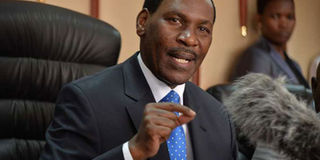Someone tell film board guys to read their job descriptions

Kenya Film Classification Board CEO Ezekiel Mutua speaks to reporters at his Uchumi House office in Nairobi on May 23, 2016. The board cannot legislate the choices artists make about creative works. PHOTO | SALATON NJAU | NATION MEDIA GROUP
What you need to know:
- But this is October, so there is little possibility that the Bill that Mr Mutua has drafted and wants to turn into law is a farce.
- This Bill is saying that the citizens of Kenya cannot be trusted to make rational judgements about what plays or movies to watch, what books to read, or what songs to listen to.
In my wedding video, there is a scene where the officiating clergyman says: “You can now kiss the bride.”
Of course, I duly proceed to do as instructed by the man of God. But if Mr Ezekiel Mutua, the man in charge of the Kenya Film Classification Board, were to have his way, this scene would be deleted or the video marked as inappropriate for certain audiences.
Similarly, the young man who shot the video cannot carry more than one copy when delivering it to me because the board’s moral police are likely to find him guilty of distributing offensive materials without authority.
The board wants the videographer, and others like him, to apply for a licence before they can be cleared to shoot such videos.
They will even need permits to shoot birthday parties and graduation ceremonies.
And if you write a play, you must get a licence before you can change any sentence.
Woe unto you if, for instance, you want to change a sentence in which the character says “my pen is here” or “that is bar talk”.
Most likely, the board will replace the word “pen” with “pencil” and “bar” with “locker room” before slapping a parental advisory on the entire production.
It is entirely possible that when Mr Mutua heard that artists enjoy poetic licence, it occurred to him that he could turn this into a revenue stream for the government by making them pay for the licence.
Had this happened on April 1, we would have had a good laugh about it.
But this is October, so there is little possibility that the Bill that Mr Mutua has drafted and wants to turn into law is a farce.
Unless we speak against it now, the otherwise hilarious Bill could easily sail through the first and second readings in Parliament and before we can say “stop joking” we might be demonstrating with Boniface Mwangi on Harambee Avenue, petitioning the President not to sign it into law.
There are many reasons Kenyans will be celebrating Mashujaa Day next week.
One of them is that we, the people, have inalienable freedom of conscience.
IT IS MY RIGHT
The State and its agents, such as the Kenya Film Classification Board, cannot legislate the choices we make either as artists or consumers of creative works.
If I choose to have a video of my wedding shot, the State cannot tell me that I cannot watch it with my boys, who were in the groom’s party.
If my guests choose to watch it at noon, the government cannot tell them that, no, this can only be viewed after the “watershed” hours, which I am made to understand is the period between 10pm and dawn.
What the government is telling me through this Bill is that it does not trust me to make rational aesthetic choices, in which case all the money that it has been paying teachers to educate me all these years has been wasted.
As an artist, I reserve the right to edit my work — that is the whole essence of copyright law.
The State recognises artists as creators. If an artist wants to change a line or a word in his work, that is his prerogative.
The role of government agencies is strictly restricted to ensuring that not every Tom, Dickson, and Harry can profit from such work without the creator’s permission. (I am sure, Mr Mutua will not object to those three extra letters.)
However, no government agency, here or abroad, can claim any right to approve or reject such edits.
Indeed, the premise of modern society is that governments have no rights, only obligations.
However, with this proposed law, the Kenya Film Classification Board is threatening to topple the very foundation of the social contract between we, the people, and the government.
TIME IS NOW
In the final analysis, this Bill is saying that the citizens of Kenya cannot be trusted to make rational judgements about what plays or movies to watch, what books to read, or what songs to listen to.
Every piece of artistic work will come complete with a caveat such as: “Oh no, you cannot watch this in your WhatsApp group, mh, mh... Delete that video ASAP or it is six months in the cooler for you.”
In short, the Kenya Film Classification Board is seeking to create an Orwellian world where even thoughts it judges to be “inappropriate” will attract censure and where words whose meaning it thinks can be misconstrued have to be replaced.
Meaning that if you are a beekeeper in Mbeere, you can’t tell us about your honey before 10pm.
It is curious that in the entire chain of command in the government, not a single man or woman has had the courage and sanity to tell the Kenya Film Classification Board that it has crossed the line, that its officials were not hired to write horror scripts and that they need to read their job descriptions carefully if they intend to remain in employment.
Mr Mbugua is the deputy managing editor of the Daily Nation. [email protected]





